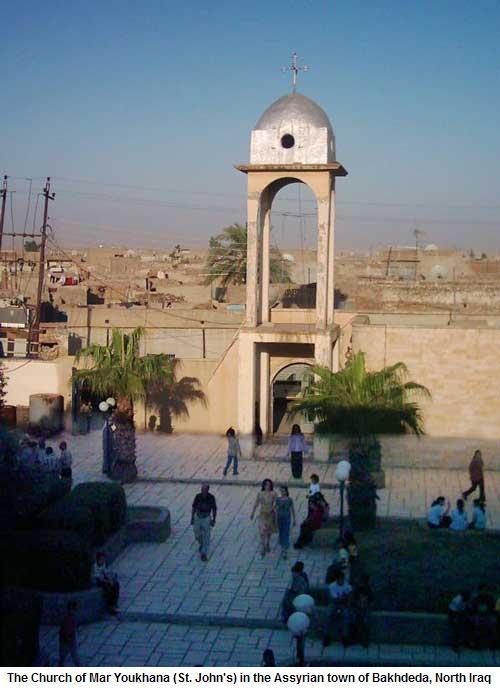

 (AINA) -- In a January 13, 2005 report from Al-Hamdaniya (Bakhdeda), a strategic district capital located between the Kurdish controlled city of Arbil and the Iraqi controlled Mosul in North Iraq, and one of the largest, most homogenous Assyrian towns in the world, Assyrian (also known as Chaldean and Syriac) sources have detailed an intensified wave of attacks by Kurdish paramilitaries tied to Kurdish warlord Masoud Barzani's Kurdistan Democratic Party (KDP). The heightened terror wave is widely believed timed to coincide with the upcoming Iraqi National Assembly elections on January 30.
(AINA) -- In a January 13, 2005 report from Al-Hamdaniya (Bakhdeda), a strategic district capital located between the Kurdish controlled city of Arbil and the Iraqi controlled Mosul in North Iraq, and one of the largest, most homogenous Assyrian towns in the world, Assyrian (also known as Chaldean and Syriac) sources have detailed an intensified wave of attacks by Kurdish paramilitaries tied to Kurdish warlord Masoud Barzani's Kurdistan Democratic Party (KDP). The heightened terror wave is widely believed timed to coincide with the upcoming Iraqi National Assembly elections on January 30.
According to the report, during Christmas mass, an armed group from the KDP militia attacked Mar Yohana (St. John's) Church in Bakhdeda. Previous attacks against Churches throughout Iraq had prompted some local volunteers to guard the Church during mass. The Assyrian guards were fired upon by KDP assailants leading to two serious injuries. A Church council committee convened to file a formal police complaint demanding an investigation and punishment of the attackers. When no action was forthcoming from the KDP, the Church council committee again inquired with the KDP personnel who had filed the original complaint. The committeemen were dismissed with denial that any formal complaint had ever been filed and warned that further pursuit of such a complaint might invite further reprisals. To date, no investigation has been carried out and no suspects have been apprehended.
Recently, Kurdish attackers have grown emboldened. In the past, attackers had strained to remain anonymous. The series of beheadings, mutilations, burnings, and shootings of innocent civilians in Mosul and the surrounding Nineveh Plain were usually carried out in isolated areas or under cover of darkness in order to conceal the identity of the perpetrators. In the most recent attacks, the assailants have been clearly identified as KDP members from nearby surrounding areas. As one Assyrian villager noted "They seemed to want us to know they were with the KDP in order to cause greater fear." Another noted that the "KDP now seemed to be advertising their involvement in the attacks."
In another incident, armed thugs claiming to be KDP forcibly entered several homes in Bakhdeda, gathered the residents, verbally assaulted and beat them. Several of the men were taken away for interrogation and remain unaccounted for. Another group of KDP militiamen attacked a Bakhdeda Assyrian family and confiscated the home for use by other KDP forces. The attackers asserted that a female relative of the family was married to a KDP member and that that entitled them to take over the home. Later, several KDP armed paramilitaries took up residence in the home.
 In another attack, the county government land deeds office in Bakhdeda was ransacked by the KDP. The Assyrian director of the office was repeatedly beaten resulting in severe head trauma. Other employees were similarly attacked and threatened. The county offices have remained closed since the attack.
In another attack, the county government land deeds office in Bakhdeda was ransacked by the KDP. The Assyrian director of the office was repeatedly beaten resulting in severe head trauma. Other employees were similarly attacked and threatened. The county offices have remained closed since the attack.
KDP paramilitaries have also systematically and regularly stolen fuel shipments destined to Bakhdeda's fuel distribution center. The stolen fuel is often sold on the black market by the KDP members. Almost routinely, a new fuel shipment is spotted by KDP scouts who shoot bullets into the air signaling their compatriots to attack the shipment. Repeated calls to KDP leadership to reign in their thugs and Coalition forces to enforce law and order have gone unheeded. One villager lamented "these thieves actually flaunt their close ties to the US military as if to say 'there's nothing you can do to stop us.'"
The attackers often enter Bakhdeda and civilian homes with ready excuses. According to one observer, "Some days they say they are looking for Baathists. Other times they say they are looking for PKK (Kurdistan Worker's Party)." Alluding to KDP tribal ties to Kurdish Islamic fundamentalist groups, he added "And, still other times, they say they are looking for Ansar Al Islam -- their own cousins. The pretexts and excuses are as plentiful as their appetite for terror."
The most recent escalation of violence against Assyrians is widely believed to be aimed at coercing local Assyrians in the Nineveh Plain and Mosul to renounce allegiance to independent Assyrian political party slates in the upcoming elections in favor of the KDP and PUK (Patriotic Union of Kurdistan) slate or at least to minimize Assyrian election turnout.
KDP pressure has targeted Assyrian civilians, leaders, and clergy. On January 9, intensified threats and pressure against Fr. Louis Qassab of St. John's Church in Bakhdeda led him to acquiesce to KDP appeals that all able bodied men in Bakhdeda enlist in a KDP sponsored village guard. The ultimate aim of the KDP guard is to compel the town of Bakhdeda and surrounding towns in the Nineveh Plain to be formally and fully integrated into the Kurduistan Regional Government (KRG) ahead of upcoming elections in order to thwart an independent Assyrian leadership that may demand a self-administered area for Assyrians in the Nineveh Plain.
The Nineveh Plain abuts against the Kurdish occupied historically Assyrian provinces of Arbil and Dohuk in northern Iraq. The area of major Assyrian towns and villages has been proposed as a ChaldoAssyrian self-administered area in Article 53d of the transitional Administrative Law (TAL). The area has also been described as the "The Last Stand" for Assyrian survival in Iraq. But certain Kurdish groups have eyed the area for future integration into a Kurdish occupied autonomous region. One analyst noted that the KDP "is trying to establish 'facts on the ground' that will de facto annex the region to the Kurdish occupied area." Alluding to the attempt to establish Kurdish led security forces and village councils, the analyst continued "the KDP hopes that by establishing such institutions directly linked to their government structure, they will enhance the likelihood that the Assyrians' 'Last Stand' will melt into the greater Kurdish area."
However, the systematic degradation of Assyrian aspirations for a self-administered area will be fiercely resisted predicted one scholar. Even Fr. Louis' call for enlistment in the KDP force will be slow and difficult since the KDP motivation is clear. "First, the KDP foments turmoil and raises the level of terror and fear amongst civilians, then they cynically offer to establish security forces under their command in exchange for abandoning our national aspirations."
The ongoing threats may have been the motivation behind last month's call by Mr. Yonadam Kanna for 1500 armed men to protect the Nineveh Plain. Although Assyrians in Iraq lack the resources to maintain such a force, the announcement was interpreted by one analyst as "code to mobilize support amongst Assyrians within and without Iraq for such an undertaking. We have that many available personnel and more. What we lack is the resources to arm and maintain them." The call for a 1500 strong police force to safe guard the Nineveh Plain is seen as a challenge to the resourcefulness of diaspora based Assyrians to help enable and maintain such a force. Referring to the close ties between US forces and the KDP, one analyst complained so far, our tax dollars have gone to aiding the KDP in terrorizing our own people."

or register to post a comment.